Introduction
The Battle of Marathon was a defining moment in ancient Greek history and remains an inspiration to this day. The battle is one of the most famous battles in ancient history, and for good reason. It was a defining moment for the Athenians, who managed to defeat a much larger and more powerful enemy in the form of the Persian army. The battle has inspired military strategists and historians for centuries and remains a symbol of courage and determination in the face of adversity. In this article, we will explore the background to the Battle of Marathon, its significance, and the myths and legends that surround it.
The Battle of Marathon: An Overview
The Battle of Marathon was a significant battle in ancient Greek history that took place in 490 BCE. It was fought between the Athenians and the Persians, who were led by Darius I, the King of Persia. The conflict began when Athens sent troops to support the Ionian Greeks, who were rebelling against Persian rule. Darius I saw this as an act of aggression against the Persian Empire and decided to launch a full-scale invasion of Greece. His forces landed at the coastal town of Marathon, just a short distance from Athens.
The Athenian army, led by the general Miltiades, numbered around 10,000 men. The Persians, on the other hand, had an army of approximately 25,000 soldiers. Despite being outnumbered, the Athenians managed to win the battle. The Athenians launched a surprise attack on the Persian army, catching them off guard. The Persians were unprepared for the ferocity of the Athenian assault, and many of their soldiers were killed in the initial charge. The Persians attempted to regroup and counterattack, but the Athenians held their ground and eventually pushed the Persian forces back.
In the end, the Athenians were able to defeat the Persian army, with only 192 Athenian soldiers dying in the battle, while the Persians suffered thousands of casualties. The victory was a significant achievement for the Athenians, who had managed to defend their homeland against a much larger and more powerful enemy. The Battle of Marathon has become legendary in Greek history, with many myths and legends surrounding it. The battle remains an inspiration for military strategists and historians to this day.
According to one story, a messenger named Pheidippides ran the 25 miles from Marathon to Athens to announce the victory, dying of exhaustion after delivering his message. This event is said to have inspired the modern marathon race. The victory at Marathon was a defining moment for the Athenians and helped to establish Athens as a major power in ancient Greece. It also had wider significance, as it demonstrated that a small but determined force could defeat a much larger army.
Background of the Battle of Marathon
The conflict between Athens and Persia began when Athens sent troops to support the Ionian Greeks, who were rebelling against Persian rule. This was seen as an act of aggression by Darius I, the King of Persia, who launched a full-scale invasion of Greece. The Persian forces landed at Marathon, a short distance from Athens. The Athenian army, led by the general Miltiades, numbered around 10,000 men. The Persians had an army of approximately 25,000 soldiers.
This is how the Battle of Marathon was Fought!
The Athenians launched a surprise attack on the Persian army, catching them off guard. The Persians were unprepared for the ferocity of the Athenian assault, and many of their soldiers were killed in the initial charge. The Persians attempted to regroup and counterattack, but the Athenians held their ground and eventually pushed the Persian forces back. In the end, the Athenians were able to defeat the Persian army, with only 192 Athenian soldiers dying in the battle, while the Persians suffered thousands of casualties.
Significance of the Battle of Marathon
The victory at Marathon was a significant achievement for the Athenians, who had managed to defend their homeland against a much larger and more powerful enemy. It also helped to establish Athens as a major power in ancient Greece. The battle had wider significance, as it demonstrated that a small but determined force could defeat a much larger army. The Athenian victory at Marathon has inspired military strategists and historians for centuries.
Myths and Legends the Battle of Marathon
The Battle of Marathon has become legendary in Greek history, with many myths and legends surrounding it. According to one story, a messenger named Pheidippides ran the 25 miles from Marathon to Athens to announce the victory, dying of exhaustion after delivering his message. This event is said to have inspired the modern marathon race. Though another legend tells of the god Pan, who helped the Athenians by creating panic among the Persian ranks. The sound of his pipes was said to have caused confusion and disarray among the enemy soldiers.
Conclusion
The Battle of Marathon was a defining moment for the Athenians and helped to establish their city-state as a major power in ancient Greece. The victory demonstrated that a small but determined force could overcome a much larger army and has inspired military strategists and historians for centuries. The myths and legends that surround the battle have added to its enduring appeal and have helped to cement its place in history. Today, the Battle of Marathon remains a symbol of courage and determination in the face of adversity.
